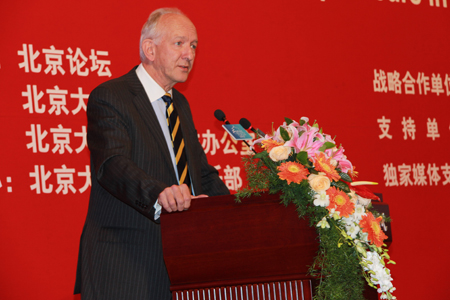Peking University, Nov. 5, 2012: “When you look into the mirror and ask yourself if you are self-content, you can’t be when you make only yourself a lot of money; you can only be content if you make others rich,” said keynote speaker Stephen Bourne in the enterprise panel session of Beijing Forum 2012 held at PKU on November 3, who was president of Cambridge University Press.
He shared with the audience what they’ve learned over the years running the Skoll Center for Social Entrepreneurship at Oxford’s SAID Business, which was created a decade ago when the concept of social enterprise was still new. Its mission is to promote the field, fund research and sponsor students who may potentially influence future business. “One thing we’ve learned is that for social enterprises and the society it’s a win-win situation. But what a social enterprise benefits from contributing to social welfare often cannot be measured, for the contribution is just a small fraction in a global context and paybacks are mostly spiritual.”

According to the definition of “social enterprise” on Wikipedia, “it is an organization that applies commercial strategies to maximize improvements in human and environmental well-being, rather than maximizing profits for external shareholders.” In other words, a social enterprise bases its strategy on of a set of goals combining social welfare with profit of the business, and often, it uses part of the profit to help people in need.
For the time being, the world’s economy is full of turbulence. Many people believe the classic core of business — maximizing the profit is partly to blame for the financial and economic crisis. They are seeking ways to right the wrong and build a better dynamic between enterprises and the society. Social enterprise is one of the answers. “I recommend students in business school to learn more about social enterprise. There are many programs of social enterprises available worldwide these days and they often last for just one year,” said Stephen Bourne. Skoll Center itself has been seen as a very successful model for developing social business thinking into a mainstream MBA curriculum.
Enterprises grow from the society so they have the obligation to pay back and build a better society, the cause of which needs concerted effort. Just as another keynote speaker Chey Tae-won, chairman of SK Group said to all guests present at the enterprise panel session, “Coming together is a beginning; keeping together is a progress; working together is a success.”
Extended Reading
Reported by: Chen Long
Edited by: Zhang Jiang